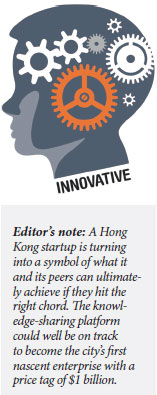'Poster child' startup on the unicorn trail
Updated: 2017-05-19 07:14
By luo Weiteng in Hong Kong(HK Edition)
|
|||||||||
Hong Kong's "unicorn" dream, it seems, may not be that far off if local startup Lynk has its way.
Lynk - a data-driven and knowledge-sharing platform linking enterprises and experts from a wide range of fields - stands as a beacon of hope for the city jostling with Silicon Valley in the US and the M4 corridor in the UK, as well as regional rivals like Beijing, Shenzhen and Singapore, for the pre-eminent edge in creation and innovation.
The home-grown company, hailed as the poster child of Hong Kong's thriving startup ecosystem by Cyberport's new chairman George Lam, could soon hit the $1 billion jackpot after having raised $4 million in a Series-A funding round led by Southeast Asia-based conglomerate Hong Leong Group last month.

Other investors include Zhuhai Da Heng Qin, Africa-focused CRE Venture Capital and Hong Kong's Cyberport, making the startup the first investee of Cyberport's HK$200-million Macro Fund launched by Chief Executive Leung Chun-ying in his 2016 policy address with the goal of helping startups fill the funding gap.
"While I was giving thought to the business that I wanted to pursue and start it up, I was always thinking of something that can connect people for advice," says Lynk founder and Chief Executive Officer Peggy Choi.
"I was able to progress through my life based on the advice and pointers my mentors had given me. Such an access may not be easy for everyone to have," she tells China Daily.
Lynk, which was founded in 2013 and secured more than $1 million in a 2015 seed round, now boasts having more than 35,000 experts across 73 countries and regions, covering almost a whole range of key industries.
Choi - an investment banker and private equity fund manager-turned-entrepreneur - says her concept was fueled by a growing trend of financial institutions going directly to experts for first-hand and in-depth advice, rather than relying on a large pile of secondary resources like research reports.
For multinational companies seeking inroads into new markets, there's always demand for local experts' views on how to gain a foothold in uncharted territory.
Large institutions make up the bulk of Lynk's client base although the startup also extends its business to small- and medium-sized enterprises.
"Typically, about eight of the world's top 10 consulting firms are our clients," Choi reveals.
With offices up and about in Hong Kong, Singapore and Mumbai, Lynk is gearing up to open its first office on the Chinese mainland - in Zhuhai's Hengqin Pilot Free Trade Zone - this month. The State-level economic district, which is part of the China (Guangdong) Pilot Free Trade Zone launched in late 2014, offers a business-friendly environment and favorable policies for startups.
The development comes as a big surprise for Choi.
She recalls that before visiting Hengqin, which played a part in Lynk's Series-A funding round and represented by Zhuhai Da Heng Qin Investment Co, getting over to Hengqin was very much a bolt from the blue.
With Lynk betting big on the massive mainland market, heading north proved to be a natural step, and Hengqin marks the company's first stop in its quest to beef up its presence across the country, says Choi.
"But, for Hong Kong entrepreneurs with neither the working exposure nor business links on the mainland, I think it would be a very big learning curve (in heading north)."
"It's not just the mainland, it can be any other region and market. As an entrepreneur, you have to think regionally and globally and always be comfortable with taking risks. This is essentially what entrepreneurship means."
What startups have been talking about in recent years was nothing but how much money they could manage to raise. Finance and real estate - two of Hong Kong's key growth engines - have remained the top choices of young talents in their bid to land plum jobs.
Local startups, grappling with a years-long "talent crunch" at the time, had been left with no choice but to vote with their feet and migrate to other jurisdictions with favorable policies.
But, the climate has changed over the years, with Hong Kong sharpening its edge as the magnet for budding startups from around the world.
Choi says she's glad seeing the city's startup ecosystem "being better for sure now".
Startups' efforts have paid off, she notes, with dazzling success stories and fledgling enterprises becoming more sophisticated and scaling greener pastures overseas rather than being glued to the paltry local market.
"Hong Kong people today are more willing to take risks and more open to opportunities that go beyond the traditionally sought-after industries," says Choi.
"They're also more resolved to think deeper and get to the bottom of what really makes startups tick."

(HK Edition 05/19/2017 page8)